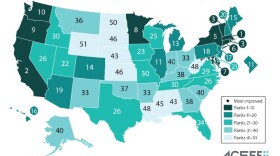Many states and communities are working to adapt their infrastructure to carbon free technologies including electric vehicles. A recently released report ranks states on how well they are enabling the use and building infrastructure for EV’s.
The American Council for an Energy Efficient Economy recently released its State Transportation Electrification Scorecard. It ranked California first, New York second, Massachusetts fifth, Vermont seventh and Connecticut thirteenth in planning for and transitioning to electric vehicles.
During a recent webinar on the report, state Department of Public Service Office of Markets and Innovation Deputy Director Zeryai Hagos said the state has established a 40 percent greenhouse gas reduction goal by 2030 and net zero economy by 2050. “Given how New York’s electric sector is generally less carbon intensive than the rest of the country we have to be especially responsive to decarbonizing the transportation sector here. We’ve set some really aggressive near term goals regarding the transportation sector which include reaching 850,000 zero emission vehicles by 2025. And that’s really been the guiding star for our near term policy implementations.”
Topping the ratings, California state Energy Commissioner Patty Monahan says there are three c’s that the state has determined must be overcome for full commercialization of electric vehicles. “The three c’s are cost, convenience and consumer awareness. We need to like scale up the market to drive down prices. Through regulations and through incentives we’re trying to really build up the market of electric vehicles. The second big obstacle is convenience and that is building out an infrastructure for zero emission vehicles. The last C is consumer awareness and making sure that consumers are aware that these vehicles exist and understand all the benefits that they can provide.”
Hagos said those 3 c’s resonate with the efforts that New York is undertaking to promote electric vehicles. “Focusing in on the individual consumer and enabling them to in a cost effective manner make a transition to an electric vehicle we have $2,000 rebates in place for EV drivers. We’ve also in the last I’d say two years ensured that every driver in the state has access to a special time-of-use rate that’s designed for electric vehicle drivers. And you know equity is also a critical component of our climate policy. We require up to 40% of our climate spending to be dedicated towards disadvantaged communities.”
The scorecard evaluated states on items such as planning, incentives, electric grid optimization, and efforts to assure equity for marginalized groups.





